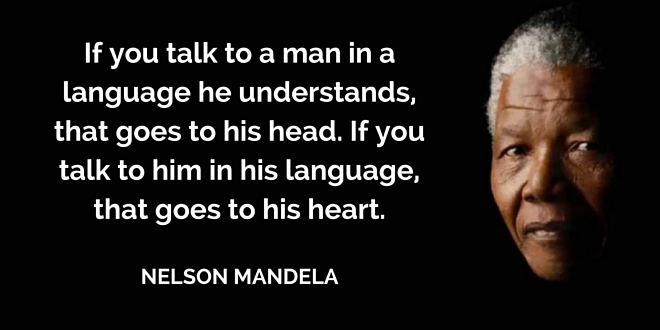21 million students learn Spanish around the world. In this post, you will discover why you should join them.
Back in 2008, I was on a trip to Africa when I realised something important. I realised that I had been living with blinkers on. I realised that my view of the world had been shaped by one small cultural corner. And if I wanted to see things from a different perspective I would have to take my blinkers off.
What I decided was on my return to Australia I would start to learn Spanish. And here’s the thing—it was one of the best decisions I ever made.
So what was the reason I decided to spend the next 7 years dedicated to learning a second language?
In reality, there are a lot of reasons. But, when I reflect on that decision, I think one of the main drivers was that I felt my education was missing something.
Growing up in Australia meant that there was not a lot of push to learn a second language. There is no need, right? We are miles from another country that speaks a different language. If I do eventually visit another country, I can always hire an English guide. And if foreigners come to Australia they will learn English.
I was fine. I didn’t need another language.
But, I was wrong.
When I made that decision back in 2008, I had no idea where it would take me. I couldn’t imagine what I would discover and the people I would meet.
In this post, I’m going to cover some of the rewards that come with learning a second language. And some of the main sources of motivation that helped me in the earlier years.
If you are thinking about starting to learn Spanish or you have already started and maybe struggling for motivation, here are some of the main reasons why English natives should be learning Spanish.
I will preface that previous sentence by saying that the following list is a combination of reasons why you should consider learning a second language (in general) and also why you should specifically learn Spanish.
This list isn’t presented in any particular order but the last 4 have been particularly strong motivators for me.
1. Learning a second language will open doors

It is only after you have learnt a second language that you really start to understand what this quote is all about.
You will discover doors that you could never see before. What do really I mean? A ‘door’ could represent new opportunities for work, new opportunities for adventure, new opportunities for love, new opportunities for self-discovery or new opportunities for growth.
I can’t say for sure what opportunities will present themselves for you if you do decide to learn a second language.
But I can say that opportunities will open up to you and in ways you didn’t expect. If you want to find out what is possible, start as soon as you can (maybe before you read the rest of this article).
2. You won’t be able to look at the English language in the same way again (but, in a good way!)
English is a difficult language to learn. I had no idea. But, now I can say I’m relieved I could learn Spanish from English and not the other way around.
When you learn a second language, you will start to see things—such as everyday English phrases—with a brand new point of view.
Idioms
With your new perspective, you can look closely at phrases like “I’ll give it a go” and see how bizarre they are. You know what ‘give’ means and you know what ‘go’ means but why do they combine to create an idea like ‘try’ something for the first time?
It’s hard to see idiomatic expressions until you start translating them from one language to another.
If you want a fun way to see the problem in reverse check out Superbritánico. It is an interesting business built on selling merchandise with printed Spanish expressions that have been translated from Spanish to English that make no sense after the translation.
Phrasal verbs
In English, we have a whole set of verbs called ‘phrasal verbs’. Foreigners dread them. And sadistic English teachers start their classes on this subject with a very cheeky grin.
I had no idea they existed until I started looking back at English from a foreigner’s point of view.
Phrase combinations like “put up with” or “put away” or “put on” all mean completely different things. For a non-native English student, understanding the idea of “putting something somewhere” is okay but then it becomes very difficult to remember that “put up with” means to endure or “put away” means to tidy or clean.
Awkward spelling
We also have some serious spelling quirks in English. We have words like “tear” and “tear”. If I was learning English, I would have some major issues remembering how to pronounce these two words.
Another example—“dough” and “cough”. Notice how the pronunciation of the “ough” changes in these two words. A foreigner who hasn’t heard these words before would have no idea how to guess what they would sound like.
Spanish, on the other hand, is the complete opposite. With only a few exceptions (the exceptions follow a simple rule anyway), almost every letter is pronounced exactly how it is written in every single word.
3. Learning Spanish actually helps your English
I’ll admit my control of the English language has never been my strong suit. But there are parts of the English language that I only really started to understand after I saw how another language is used.
We don’t really learn grammar in school—maybe we don’t need to? I’m not sure.
But, these days, when I have conversations with my friends about direct objects, prepositions and subject pronouns they all look at me sideways.
I also can’t help but get annoyed every time someone corrects “my friend and me” to “my friend and I” even when “my friend and me” are the objects of the sentence. If someone says “my parents gave a present to my friends and me”, it’s correct!
This is just one small example of how you can re-discover the English language or maybe properly learn it for the first time.
4. Opportunities for work
If you can speak Spanish you can find opportunities for work both at home and overseas.
If you’re in a Spanish speaking country, you could work as a translator or an English teacher.
If you are at home you could find work for companies that run joint ventures with Spanish companies. You could find fly-in-fly-out work for companies that run location-based projects in areas such as South America.
A good friend of mine just came back from a year working in Santiago, Chile. Both he and his girlfriend found opportunities for work over there using their Spanish skills in their day jobs. And neither job was based on teaching—he was working for a mining company and she was looking after children.
4. Language learning creates life long friendships

You will be amazed at the response you will get when you talk to people in a Spanish speaking country.
When I was in Pamplona, I was sitting on a fence waiting for the running of the bulls. I started a conversation with a local boy sitting next to me. He could not believe that I could speak Spanish. He said that most Australians that he had spoken to couldn’t even respond to a simple ‘hola’. More often than not he said the typical response was ‘dude, I don’t speak Spanish’.
When you show someone the effort you have made to speak their language, the response can be overwhelming. You can make friends very quickly. And don’t be surprised when you find yourself still speaking with them years later.
5. It’s rewarding to learn Spanish and help someone learn English
Let’s face it, English is the language of the business world. In countries like Spain, English is seen as crucial for better work opportunities.
You can help!
Helping someone makes you feel good. Even if you only have a basic conversational level of Spanish you can find language exchanges and help someone grow their English while they help you grow your Spanish.
I don’t want to get too deep on you in this article. I was never playing on bringing up questions about the meaning of life. But if we aren’t here to help others, what are we here for?
6. Opportunities for discovery while on vacation
Learning Spanish has given me a number of opportunities to see and do things that I couldn’t have expected to see or do if I had never started.
One example—an important bucket list item for me—was to see a big European soccer game. Last year, I had the opportunity to go to La Supercopa De España. I got the opportunity from a good friend that I met through a language exchange. He is a massive fan of Atlético Madrid.

In the game, Atlético Madrid defeated Real Madrid and it was the first time Atlético had won La Supercopa since 1985. It was some night!
Sometimes the opportunities are much smaller and unexpected.
When my girlfriend and I were in Marrakech in Morocco, we were waiting to get into our accommodation down a small dark side street. We had been waiting for over an hour. We weren’t sure if our host ever was coming. Or if it was the right place to start with.
After knocking on the door and trying the phone number we were supposed to call for the 10th time, an old lady stepped out from a door on the opposite side of the street.
She started speaking in French and it was obvious she didn’t speak English. But, shortly after we discovered she could speak Spanish. She then invited us into her home for tea. We spent over two hours chatting about life and travels. It was a great experience and one I will always treasure.
7. Avoiding hassles while on vacation
In contrast to reason number 6, being able to speak Spanish can help you avoid trouble or annoying inconveniences while aboard.
When I was in Madrid I wanted to park our rental car in a paid garage. I ended up in 15-minute discussion with the parking attendant in an effort to understand whether or not our car was going to get locked in the garage all night.
If it wasn’t for my Spanish we may have been stranded in Madrid.
8. The discipline required to learn Spanish is transferable
In ‘The Power of Habit’, Charles Duhigg wrote about something he called a ‘keystone’ habit. These types of habits are useful because when you focus on them, they affect all other areas of your life. One of the most important keystone habits is willpower.
Duhigg explains that willpower is like a muscle. It gets tired throughout the day. But, if you use it more often, you will have more of it when you need it.
If you can develop the discipline to sit down and do 30 minutes of Spanish study after a full days work, you will grow your willpower muscle.
If you can develop this keystone habit it will have a knock-on effect in other areas such as fitness, your job or your relationships with family and friends.
9. Spanish is spoken by 450 million people
I would be remiss if I didn’t reference the number of people and the number of countries where Spanish is spoken.

If you love to travel, Spanish is great. It is spoken in 20 countries and by 450 million people.
Here is a list of countries where Spanish is the official language.
10. There are so many English-Spanish cognates
I don’t really like debating whether one language is easier to learn than another. Why? Because learning a language—in general—is difficult.
It’s like asking what’s harder to lift: 500 pounds or 550 pounds. Yes, 500 pounds is “easier” to lift. But it’s still really hard!!
Having said that, Spanish is definitely the 500-pound weight.
If you decide to learn Spanish from English it comes with a lot of upsides. The languages share an alphabet and there are tonnes of English-Spanish cognates—these are words that mean exactly the same thing and are spelt the same in both languages.
There are hundreds of these common words, all you have to do is learn the basics of Spanish pronunciation and you will effectively start with a Spanish vocabulary of more than a thousand words.
11. Learning a second language improves your brain
It definitely doesn’t feel like it while learning.
In fact, when you are learning a second language you feel really dumb—all the time!
It sucks to make lots of mistakes. And typically, as adults, we tend to avoid activities that make us feel vulnerable.
But, it does help the brain. A lot! There have been a number of studies that have demonstrated the benefits of learning a second language as an adult.
If you have issues with a bad memory, then this a good reason to start learning a language, not an excuse. Our brains are incredibly adaptable, they just need to be challenged on a regular basis.
It’s the old adage “use or lose it”, but maybe it should be “use it to improve it“.
12. Find the love of your life (or at least expand the dating pool)
Recently on the Real Fast Spanish podcast, I interviewed Shayna Oliveria who found her husband in Salvador, Brazil.
She talked about how, up until recently, her husband didn’t speak English and that the opportunity was there because she learnt a second language.
If you are single and having trouble finding a mate in your local town, state or country, a second language could significantly increase your options.
Even if you are happily in a relationship—you never know—you may want the option someday.
13. In the US, Spanish is spoken by 16% of the population
I’m not exactly sure when a nation decides it has another “official” language.
In Canada, both French and English are recognised as the official languages of the country. According to the 2011 census, 21.3% of the population in Canada call French their mother tongue.
The figure of 16% for Spanish in the US is moving very close to the percentages of French speakers in Canada.
Regardless of whether Spanish is technically an official language or not, it is widely spoken and worth knowing if you want to communicate with more than 1 out of every 10 people.
14. There are lots of awesome Spanish books
This could be a long list. But, I will keep it short.
There are some great books in Spanish but when you are first starting out it can be a hard slog getting used to reading in another language. It can be a real pain if you have to constantly keep referring to a dictionary.
For beginner readers, I recommend finding a dual text, something like:
You could also choose books that are written for teenagers. There is a series of novels by Elvira Lindo based on a 10-year-old character called Manolito Gafotas. They are fantastic!

and Carlos Ruiz Zafón. But the books by these authors are quite challenging.
If these books aren’t challenging enough, you could even step it up again with the famous ‘Don Quixote’ by Miguel Cervantes. This is a classic book of Spanish literature. But, if I’m honest, I’m still not ready for this book yet.
15. There are lots of awesome Spanish movies
Before I start recommending movies, I have to say that a lot of Spanish movies come with adult ratings. It seems that the culture in Europe has a much more relaxed attitude towards sex than what I am used to in Australia. This relaxed attitude may be the reason that such a large percentage of Spanish movies includes sexual references.
Having said that, I will recommend 4 movies from different genres that would appeal to different maturity levels. You can think about who you are planning to watch the movie with and choose accordingly.
Teenage adventure:
‘El Laberinto Del Fauno‘, or ‘Pan’s Labyrinth’ in English, is a dark fantasy set around the time of the second world war. It is the best choice for a younger audience.

Romantic comedy:
‘Ocho Apellidos Vascos‘, or ‘Spanish Affair’ in English, typifies the romantic comedy genre. It hits all of the formulaic highs and lows that come with the category. It is also the highest-grossing Spanish movie in history. I’m normally not of fan of this genre but I liked this movie a lot. I’ll also admit that I’m a bit in love with Clara Lago who plays the female lead.

Horror/scary movie:
Straight up—I’m a wimp when it comes to scary movies. But, I forced myself through the following film because I have friends that aren’t even interested in Spanish that tell me this is one of the best horror movies of all time—from any country! The movie is called ‘REC‘ and in short, it is a zombie movie. It is the typical kind of scary movie where each character gets picked off one by one. But, it is done really well. It was filmed using the ‘handheld camera technique’—which is always scary—and it is difficult to predict what is going to happen next. Plus the characters are locked in an old apartment building throughout the night. If you learning Spanish and you like scary movies, its a must!

Drama/mystery:
I mentioned, at the start of this section on movies, that Spanish cinema is full of nudity. Well, so far, I have done well to avoid it. But in this last recommendation, that goes out the door. The movie is called ‘Lucía y El Sexo’. Obviously, a movie with sex in the title is likely to have nudity. But I don’t recommend the movie because of the nudity. This movie is really good. It is intriguing and mysterious. There are plot twists and things aren’t as they seem. If you like a movie that doesn’t follow the typical formula, this is great.

If you do decide to practice your Spanish with movies then, in order, try first with English subtitles, then with Spanish subtitles and then without.
To finish off this section, I have to offer a word of warning about practising with Spanish movies, don’t be too disheartened if you can’t follow the Spanish—normally it’s fast, colloquial and muffled.
It is much better to practice your listening comprehension in a one-on-one situation with a native Speaker.
16. Spanish is a great “gateway language”
When I say “gateway language” what I mean is that if you successfully learn Spanish it could be a catalyst for you to go on and learn 3, 4 or even 10 other languages.
This is a controversial point because it could be argued that the requirement for a “gateway” into language learning is that you are simply motivated to start.
Said in another way, if you are really interested in learning Mandarin then it is a very backwards strategy to start learning Spanish in order to learn Mandarin.
But, conversely, if you are undecided on a language to start with and simply looking to learn a language in general, Spanish should be right at the top of the list. Why? Because Spanish is the 500-pound weight. (see point 10)
When I chose Spanish it was because I thought that languages like Japanese, Mandarin or Russian would be simply too hard for me to get any traction with and hence I would be more likely to quit.
Starting with Spanish could give you the confidence to realise that there is no such thing as a natural language learner and that you could move on to other languages once you have learnt how to learn.
Internet famous polyglot Benny Lewis got his start with Spanish and then went on to learn 8 and 6 other languages respectfully. Personally, after studying Spanish for 12 years, I now have spent two years learning French and I’m also considering learning Italian or German next.
17. Learn about another culture and in turn learn about your own
I mentioned earlier that when you study another language you learn about your own. This is also true for culture.
In fact, this has been one of the most fascinating parts of learning another language. You get to see how another culture approaches simple things like drinking at the pub or big things like how to have a wedding.
At the very start of the post, I mentioned that I was living with blinkers on. This is what I was talking about. I thought for a long time that the way things are done here are the ways things are done everywhere.
A comment I often get from Spanish friends who live for a period of time here in Australia is that if you want to see your friends here you need to fit them into your busy schedule. In order to catch up with your best friend from high school, you need to ‘book something in’ for four weeks time. What’s worse, as the date approaches, the ‘booking’ may have to be moved around.
In Spanish culture, if you feel like seeing a good friend, you catch up with them that day. Simple! If it is a Tuesday night and so-and-so is at so-and-so’s house, everybody goes over and all of a sudden it’s a party.
I’m not saying we should be living like this all the time. And, for some, this kind of social ‘chaos’ could be a nightmare. But, it is always a talking point when I catch up with my best friend from university on a depressingly bi-annual basis.
18. Impress your friends/show off at parties
While I don’t advocate learning a language to impress friends, nor is it a great long term strategy for motivation, it is impressive. Particularly in western culture.
Not a single one of my high school friends speaks another language. It’s sad. But, the fact that it is unique makes it impressive.
When you do tell people that you can speak another language they are normally quick to ask more. How did you find the time? Why are you learning? You must be really smart?
Let’s face it, the attention is nice and it is fun to show off every once in a while.
19. Listen to conversations you wouldn’t normally be able to listen to
As I write this point, voyeuristic scenarios come to mind. Situations like when you’re sitting on a train and listening in on a conversation that you shouldn’t be listening to.
With your newly established language skills, you could listen in on Spanish conversations as well. Maybe the two people sitting opposite you on the train are speaking about you and they assumed you wouldn’t understand them (in reality, that’s unlikely).
But more practically, you could find yourself in a situation in a Spanish speaking country where locals are trying to pull the wool over your eyes by selling you something dodgy or double the regular price.
Or worse…
In ‘The Promise of a Pencil’ (one of my favourite books), Adam Braun describes a situation when he was on a bus in Guatemala. He could speak Spanish but pretended he couldn’t. He listened in horror as the boys on the bus debated which items they were going to steal from him. One said “I want his wallet”, another “I want his passport” and another “I want his shoes”.
I hope you never find yourself in a situation like this, but I’m confident that if you do you will be thankful that you had diligently completed your Spanish homework.
20. Understand the lyrics to those songs you love to sing along with
We all have guilty pleasures. I’ll admit it. I know I’m not the only one that sings along to the typical ear-worm pop song. The kinds of songs where it would amount to social suicide if you did decide to tell anyone that you liked them.
I’m not sure about you, but where I grew up it wasn’t cool to sing along to Shakira or Ricky Martin. But who cares, we do it anyway.
If you do decide to learn Spanish, you will be able to rediscover popular Spanish songs from your teenage years (or nowadays) and find out what they were all about.
21. Spanish is a beautiful language
I can’t believe it’s taken this many points before I got to this one.
It sounds beautiful.
(And it even feels good to speak.)
22. Complete unfinished or missing education
Do you ever feel like there was some unfinished business from high school? Maybe mathematics got the better of you and now you want to see if you can conquer it with a more mature perspective.
This is exactly how I felt about language learning.
In high school, foreign language learning got the better of me. I was a pretty good student. So it was embarrassing when I received a fail mark. At the time I vowed I would never learn a foreign language, but that was a bruised ego talking.
If you feel like language learning got the better of you, it is never too late to have a second go.
23. Because you like a challenge
I often send out survey’s to the newsletter subscribers and it turns out 27% of subscribers are learning Spanish because they like a challenge.
Me too!
Some people like Sudokus or daily crossword. Some people like to play chess. Some people like to go to trivia nights.
And some people love to learn languages!
If you feel like your day job is a little on the boring side or you are just in desperate need of a mental challenge, language learning is perfect.
If you do decide to learn Spanish or any other language, you will have a great source of ongoing material to challenge your brain every day.
24. Spanish food is amazing
Did I mention…

Or…

Or…

Or…

¡¡¡Que rico!!!
25. People
Spanish people are awesome! I know I shouldn’t make generalised statements like that. But, from my experience, the people that I have spent time with from Spain and South American countries do seem to have common traits:
- They are warm, welcoming and love the company of family and friends.
- They like spending time with each other even if it is late on a work night.
- They love to discuss the big issues just as much as the finer things in life.
- They celebrate and are proud of the things that make their culture unique (except for maybe bullfighting).
- They love quality food and wine and will always defend their right to consume these things.
- They welcome foreigners who are interested in learning about their language and culture with open arms.
To sum up
If you are thinking about starting to learn Spanish…stop thinking!
Start as soon as you can!
Motivation is really important, so choose one of the 25 reasons above to push yourself over the initial hurdle to get moving.
If you have been learning for some time then you can also use the reasons listed above to keep up the momentum.
I believe strongly that even if you don’t have to learn a language for work or school and even if you aren’t planning an overseas trip, language learning is something that we should all seriously consider.
It will help you see your own world with new eyes. And although you can’t truly see through someone else’s eyes, language learning can help you understand just a little bit better how the rest of seven billion people on this planet live and see their world.






Thanks Andrew. As you know, I’m already on my learning journey, but the occasional reminder of why I do it is always a good motivator.
Hey Alan, thanks for the comment and I’m glad it helped. BTW, which is your biggest motivator from the list?
I agree with all the points, but I suppose the challenge is the best (and possibly the worst) part of language learning. Making a breakthrough in understanding is such a satisfying feeling. It’s like a massive puzzle, and you have to really work at putting all the pieces in the correct place. The only thing is, there are always more pieces than you think!
You can definitely keep adding pieces to the puzzle for as long as you want, if it works to help you stay motivated and the challenge keeps you in the game, use it!
As you can see, one of my challenges is to reply in the correct box. Working on that too.
My biggest motivator isn’t really any of the above reasons. I live in an area of the United States where Spanish is spoken by many people – you hear it everywhere, in all the stores, in the post office. All the signs in the stores are in English and Spanish here and even our voting ballots are in English and Spanish. I had tried to learn Spanish for many years.
Then a young man who became like a second son to us after his mother died in a car accident married a young woman from Honduras. She spoke only a bit of English when she came here 15 years ago. I thought sure I would learn Spanish then – well, I didn’t. She learned English very quickly though. They have two boys who are our grandsons, they are bilingual. Many of her family have moved to the US over the years. At family gatherings my husband and I were the only ones who did not speak Spanish. That was my final motivation – I was tired of sitting there not knowing what people are talking about! In January 2015 I started on a serious journey to learn Spanish and have done very well. The hardest thing for me is understanding people when they speak Spanish at real speed. I am able to understand the television quite well but when I have to listen to and speak Spanish at the same time – my brain gives out on the listening part. It frustrates me very much that I can understand spoken speech if I am listening to the TV but have a very difficult time when I am listening to a real person and have to respond, too.
Now, I know enough Spanish that I am helping a lady from Honduras learn to speak English. It started out as a language exchange type thing but now we are concentrating more on her learning English. Surprisingly, I am learning so much Spanish as I teach her to speak English! Like you, I have come to realize what a strange language English is – we say so many things that don’t really make sense at all!
Right now, I am taking your listening comprehension course. I hope it will help me with my problem understanding spoken Spanish. I am on day 8 now and so far the listening has been easy and I haven’t had any problem understanding. For some weird reason, I can understand Spanish quite well until I have to take an active part in the conversation.
Your posts are very helpful!
I was wondering have you ever read
The manolita gafota books? I tried to read it and I didn’t like it and that’s because my Spanish level isn’t there and also because the book disinterested me. I confirmed it with the English version. It’s unreadable to me. It’s so dull boring unimaginative. I was expecting something that’s actually well written and fun to read along the lines of Ronald Dahl or jerry spinelli or rl stine or dan gutman and all those other good children/youth authors who write fun books. Anyways does anybody have recommendations for books that are actually good ?
Hi, thank you for your comment. It’s a shame you didn’t like the Manolito Gafotas books. I haven’t really read any other children’s books in Spanish but I did like Paulo Coelho’s – El alquimista. If you do find some good Spanish children’s novels like Ronald Dahl, please share what you find!
I hate to sound like the grammar police, but disinterest is not a verb. It’s a noun. So to say, “it disinterested me” is incorrect. Also disinterest has two meanings, being impartial and not caring about something. Sorry to sound pedantic. I speak Spanish and the word “disinteres” has always fascinated me since it is often used incorrectly.
Btw I loved reading this post because it was genuine. Usually when I read posts with a number like 10 reasons to do x, it always feel like the person starts running out of reasons or the reasons they list are so obvious or not explained in depth. All in all they feel gimmicky and pointless to read (the stuff they write is something everyone already knows anyway unless you’re an idiot) . Anyways I will check the alchemist book you mentioned.
Thanks for your kind words!! Please let me know if you like the alchemist.
Really inspirational, and also loved your experiences with Spanish, even though you were arguing with the parking guy lol
Thanks Diego, I hope it helps you stay motivated!
I loved your article, gracias! I am Colombian and teach Spanish privately in Canada. I will share your article with my students. Excelente, muy buen articulo gracias!
Gracias a ti Norha por compartir. Me alegro mucho de que te guste.
I was in the midst of backing out of a trip to Guatemala to lean Spanish and instead stay in Arizona to continue my career in Biology. I was having trouble reasoning why I should even learn Spanish when I want pursue neuroscience. Then I came across your post and it made me reconsider my original plan. Muchas gracias!
I’m so glad the article has inspired you Hannah. If you stick with it, you will have lots of opportunities for incredible experiences in your future (which are impossible to imagine now). ¡Buena suerte!
I teach Spanish at the local community college as an enrichment course. I start my classes today. I have taught ESL for many years but teaching Spanish is new to me. I speak it fluently after living 25 years in Latin America and Spain so I am familiar with the problems gringos have in learning it. Motivation is the key and your article was just the right tonic to present to my class tonight. Can you recommend a good lesson book for people wanting to learn Spanish? The bookstores are full of books and courses on learning Spanish but I would like your suggestion.
Thanks Jerry for your kind words. I totally agree there are lots of books and courses out there, I have 25+ Spanish books including grammar books, text books, dictionaries, and dual texts sitting on my bookshelf. I’ll be honest and say that it is difficult for me to give an unbiased answer to this question because I have spent the last 5 years developing my own curriculum for learning Spanish. If you check out the free guide that I wrote “The Definitive Guide to Conversation Hacking in Spanish” (see sidebar or bottom of the page), you will learn about some of the most important concepts for learning Spanish quickly and effectively that I believe most Spanish books and courses don’t address.
Mi nombre es elizabeth james y soy de los ee.uu., tuve luchas de relación en el pasado que llevó al divorcio con mi primer marido y verdaderamente amado. Después de que mi ex marido se divorciara, tuve la oportunidad de volver a casarme de nuevo y sólo 2 años de mi segundo matrimonio hubo otra ruptura que casi me mató emocionalmente. Me quedé un año más soltera y una madre soltera. Honestamente yo no estaba muy feliz siempre, hubo un tiempo vi mi primera foto de maridos y me di cuenta de lo mucho que lo amaba y le he echado de menos. Traté de llegar a él, pero me dijeron que se mudó a España y que nunca puede volver a verlo. Lloré amargamente esa noche pensando que perdí al único hombre por el que he tenido tanto amor. Le pedí a algunos amigos que me aconsejaran qué hacer y un amigo mío me dio el profeta odiba de Permanent Spell Casts lo consulté y lo mejor de él con sus poderosos voodoos me ayudó con un hechizo de amor y devolvió a mi ex marido de vuelta a mí en 3 días. Estoy viviendo felizmente con mi primer marido y estamos casados de nuevo. Tú eres un hombre de tu palabra profeta odiba, gracias y agradezco toda la ayuda que me has prestado. Por favor, póngase en contacto con este potente lanzador de hechizos también por correo electrónico: [email protected]
As a native Speaker of Spanish, I am in loved with the language. It has a wide range of vocabulary that describes multiple emotions in ways that English perhaps feels short sometimes. Being able to share about my culture and traditions is a great opportunity that I have in the US working as a teacher. Nevertheless, I face the ultimate challenge in the classroom regarding motivation from my students.
I work as a Spanish teacher at an immersion school in GA. I love my career and I always put passion into my classes to make them challenging and an fun at the same time. I use flashcards, print out, multimedia apps, games, board-games, song and more, but sometimes it feels like my students are not engaged or just don’t care to appreciate the opportunity that they have to learn a new language and don’t practice it. Instead, every time that I turn around they speak in English. What would you suggest to motivate my students to speak only in Spanish?
Hola David, thanks for the question!!
I must say that I think this is the question that every teacher has asked themselves since the dawn of time — how to do I motivate my students? Even helping adults has the same problem — how do I motivate anyone to do anything? How do coaches motivate athletes? Managers motivate workers? Parents motivate their children?
I’m going to give you vague answer (only because it is a very difficult question):
You have to get your students intellectually and emotionally engaged in the process of learning Spanish. To get your students intellectually and emotionally engaged, you first have to understand what they really want (e.g. popularity, looking cool, friendships, freedom, respect), you then have to somehow appeal to the negative and positive cases of both the intellectual and emotional. E.g. what do the students stand to lose if they don’t learn Spanish? And what do they stand to gain if they do learn Spanish? Then if you can find good answers to these questions in the context of what the students really want, you might get lucky with a few motivated students. ¡Buena suerte! 🙂
I suggest to just keep helping them and helping them until they get the feel of the language of spanish
Hi everyone!
I am Spanish and love the article!!!! I love languages (I speak Catalan, Spanish, French, English and some Malagasy and Kandoshi. Wherever I go I try to learn! 🙂 ).
So a to offer options of improving your Spanish level (lol), I take advantage of the situation and expose my proposal to make the best of a language exchange for those English natives who would like to improve their Spanish: I have been looking for years for a family with a kid aged around 9, like mine, whose parents learn Spanish and whish his son to improve by living in Spain for some time (7 days, for example?). The idea is that all the familly together would stay in our house. And later on, we would be staying for a similar period in yours.
Does it suit you? Language and cultural immersion, the best way to lear a language!!! And even better for kids! If you are interested, please feel free to contact me at [email protected]
Forgive my mistakes!!! I try to make the best of my studies!!
Saludos y hasta pronto!!!!
My husband and I are planning to celebrate our anniversary coming up in a few months by going to Chile. We are thinking about learning some Spanish before we go so that we can communicate better and get to know the culture. I didn’t realize that there are so many benefits of Spanish like the fact that it will help us to make life long friends that we wouldn’t have been able to talk to without learning the language.
Thanks for sharing Rosie 🙂 I hope the anniversary goes well!!
I’m still not sure if I should study German, Spanish or french…. there are so many good reasons to learn all of them >=<
Yes, it’s a tough choice! But, this article couldn’t convince you to start with Spanish? 😉
Disfruté mucho tu artículo, Andrew. Muchas gracias.
Lo he usado en mi página de Facebook e incluído el link.
Saludos
¡Gracias Roberto! 🙂
Señor Barr:
De nuevo me gusta mucha tus artículos con sus explicaciones y razones para aprender español.
¿En Marrakech usted finalmente encuentran su anfitrión sobre su acomodación?
Me encanta muchísimas Shakira. las músicas y sus canciones especialmente en españoles.
Algunos otros libros en español que son agradables de leer sobre todo comenzando a aprender español; Por ejemplos: por J.K. Rowling, “Harry Potter y La Piedra Filosofal, y “El Principito{, por Antoine De Saint-Exupéry y Las Chronicas de Narnia: “El Leon, La Bruja y El Ropero por C.S Lewis Y uno más La Teleraña de Carlota.” por E.B. White, autor de Stuart Little, dibujos de Garth Williams. Estos libros eran muy interesante también estan escritos en inglés y útiles para mi.
Muchas muchas gracias por sus recomendaciónes y compartimiendo su conocimiento, Señor Barr.
Cuídate,
Debbie
¡My bien! Gracias por compatir Debbie 🙂
Hola Andrew!
I really enjoyed this article as several items resonated with me. I recently retired, but worked for many years with folks in Latin America without learning Spanish. I picked up bits of vocabulary after spending two week stints of being in country on multiple occasions and loving the culture. I interacted with folks from Guatemala for several years and often teased about running our meetings in Spanish, but never took the plunge.
Since I have retired, I have started to learn Spanish. There is a weekly class taught at my local Senior Center and I have been using the Duolingo app for daily lessons. I have made it 272 consecutive days and remain motivated.
Brilliant Dennis, keep up the good work!
Hi, Andrew, this is Shravan from India. I have started learning spanish on Duolingo app …. How long will it take me to learn ? Also which youtube channels should I follow to polish my spanish ?
Hola Shravan, thanks for the comment. The time it takes to learn Spanish depends on how good you want to be and how hard you are prepared to work. For your question on Youtube channels, you should watch the Real Fast Spanish Youtube channel, of course 🙂
Hola Andrew! Real appreciation for your work and efforts to help others to learn Spanish.
I’m from Ukraine, Russian native speaker, and I started learning Spanish already after English. By that time I had fluent English, coz was working abroad. now I can evaluate my level of Spanish as upper intermediate, and I’ve been listening so many Spanish speaking bloggers on YouTube. But I am still chasing perfect knowledge of the language, my dream is to use it in my career and your articles have been so helpful for me. Keep it up!!
Huge thanks once again))
I’m glad the articles have been helpful! Thanks Yurii!! 🙂
This was a fantastic article, genuine, diverse and actually quite funny. I think I’ll take the plunge and start learning.
That’s great Rohan! I’m so pleased to hear you enjoyed the article and even better that you have decided to give Spanish a go!! 🙂
Omg! I have never thought I would read such an inspirational article indeed when I started. I was ready for reading some dull headlines but I have read it all with amazement. I am a native Turkish speaker speaking English as a second language. So I felt everything you mentioned about phrasal verbs and other rules that might challange you in English cause I had been there. I have always loved Spanish language, phonetic, culture and everything. Now that I have my whole summer ahead of me I wanted to plan to study consistently. But before, I wanted to read something motivational and I see that I am in the right place. Thank you so much I appreciated your article. I really enjoyed it you inspired me a lot.
I’m so pleased to hear that Ezgi! Thanks for the kind words and the great feedback!! 🙂